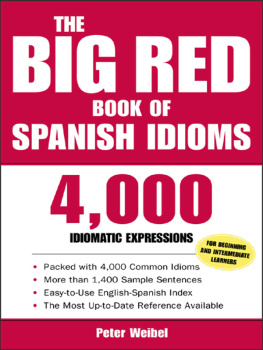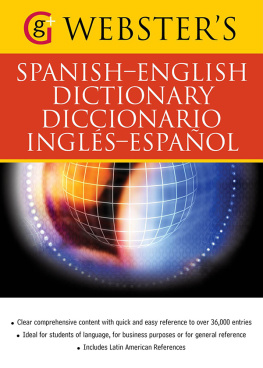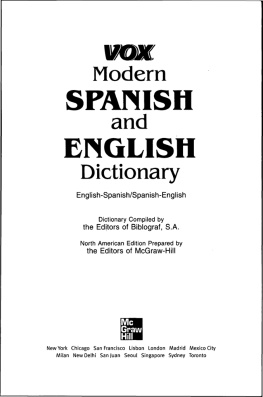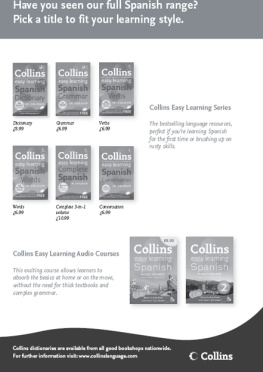THE
BIG RED
BOOK OF
SPANISH IDIOMS
Also available:
Gordon & Stillman/The Big Red Book of Spanish Verbs
Gordon & Stillman/The Red Pocket Book of Spanish Verbs
THE
BIG RED
BOOK OF
SPANISH IDIOMS
12,000
SPANISH AND ENGLISH EXPRESSIONS
Peter Weibel
McGraw-Hill
New York Chicago San Francisco Lisbon London Madrid Mexico City
Milan New Delhi San Juan Seoul Singapore Sydney Toronto
Copyright 2004 by The McGraw-Hill Companies, Inc. All rights reserved. Except as permitted under the United States Copyright Act of 1976, no part of this publication may be reproduced or distributed in any form or by any means, or stored in a database or retrieval system, without the prior written permission of the publisher.
ISBN: 9780-07-144261-9
MHID: 0-07-144261-8
The material in this eBook also appears in the print version of this title: ISBN 9780-07-143302-0, MHID 0-07-143302-3.
All trademarks are trademarks of their respective owners. Rather than put a trademark symbol after every occurrence of a trademarked name, we use names in an editorial fashion only, and to the benefit of the trademark owner, with no intention of infringement of the trademark. Where such designations appear in this book, they have been printed with initial caps.
McGraw-Hill eBooks are available at special quantity discounts to use as premiums and sales promotions, or for use in corporate training programs. To contact a representative please e-mail us at .
TERMS OF USE
This is a copyrighted work and The McGraw-Hill Companies, Inc. (McGraw-Hill) and its licensors reserve all rights in and to the work. Use of this work is subject to these terms. Except as permitted under the Copyright Act of 1976 and the right to store and retrieve one copy of the work, you may not decompile, disassemble, reverse engineer, reproduce, modify, create derivative works based upon, transmit, distribute, disseminate, sell, publish or sublicense the work or any part of it without McGraw-Hills prior consent. You may use the work for your own noncommercial and personal use; any other use of the work is strictly prohibited. Your right to use the work may be terminated if you fail to comply with these terms.
THE WORK IS PROVIDED AS IS. McGRAW-HILL AND ITS LICENSORS MAKE NO GUARANTEES OR WARRANTIES AS TO THE ACCURACY, ADEQUACY OR COMPLETENESS OF OR RESULTS TO BE OBTAINED FROM USING THE WORK, INCLUDING ANY INFORMATION THAT CAN BE ACCESSED THROUGH THE WORK VIA HYPERLINK OR OTHERWISE, AND EXPRESSLY DISCLAIM ANY WARRANTY, EXPRESS OR IMPLIED, INCLUDING BUT NOT LIMITED TO IMPLIED WARRANTIES OF MERCHANTABILITY OR FITNESS FOR A PARTICULAR PURPOSE. McGraw-Hill and its licensors do not warrant or guarantee that the functions contained in the work will meet your requirements or that its operation will be uninterrupted or error free. Neither McGraw-Hill nor its licensors shall be liable to you or anyone else for any inaccuracy, error or omission, regardless of cause, in the work or for any damages resulting therefrom. McGraw-Hill has no responsibility for the content of any information accessed through the work. Under no circumstances shall McGraw-Hill and/or its licensors be liable for any indirect, incidental, special, punitive, consequential or similar damages that result from the use of or inability to use the work, even if any of them has been advised of the possibility of such damages. This limitation of liability shall apply to any claim or cause whatsoever whether such claim or cause arises in contract, tort or otherwise.
 Professional
ProfessionalWant to learn more?
We hope you enjoy this McGraw-Hill eBook! If youd like more information about this book, its author, or related books and websites, please click here.
For more information about this title, click here.
Contents
Acknowledgments
I wish to convey my special thanks to Kim, my wife, and Ron Nagel. Their help and support made it possible to finish this project.
My appreciation also goes to Christopher Brown, the editor of this book, for his advice and suggestions. Last but not least, I would like to thank Susan R. Moore for her meticulous review of the book.
Introduction
In the early 1970s I went on vacation to Galicia, Spain. On the thirty-four hour train journey from Bern, Switzerland, to La Corua I got into conversation with a Spaniard. He was very knowledgeable about Spanish literature and recommended to me the writings of Cela; this was the first time that I had heard of this author.
Many years later, in late 1989, a headline in the arts pages of a newspaper caught my attention: The Nobel Prize for Literature goes to Camilo Jos Cela. This prompted me, finally, to acquaint myself with his works. Typical of his style is La Colmena, a novel peppered with col-loquial and slang expressions. As I read it, I felt the need for a reference for English speakers that dealt comprehensively with such Spanish terms, so I began to jot down words. From these beginnings I developed this dictionary of commonly used Spanish expressions that are often difficult to find in standard dictionaries. My sources have been as diverse as the expressions themselves: Nobel Prizewinning authors and Juan Prez (the man in the street), professors and students, contemporary and classical literature, dictionaries, movies, and newspapers from across the Spanish-speaking world.
The Big Red Book of Spanish Idioms is a comprehensive reference designed to open up the world of idiomatic Spanish to English-speaking learners, including students, travelers, and language-lovers, who have an intermediate or advanced level of understanding of Spanish. The dictionary contains a broad collection of over 4,000 commonly used idiomatic and colloquial expressions in Spanish and almost 8,000 English translations. Particular care has been taken to match like with like, so that Spanish idioms are matched with idiomatic English expressions of a similar tone or register. This feature also makes the dictionary a particularly helpful reference for Spanish-speaking learners of English.
Using the Dictionary
1. LOCATION OF A SPANISH EXPRESSION
To look up a particular Spanish phrase or expression in order to find its English equivalent, turn to the main Spanish-English dictionary. Each expression is listed under one particular Spanish headword, and the headwords appear in alphabetical order, though initial articles (
el,
la,
el/la,
las,
los) are not alphabetized. The idiomatic expressions (preceded by

) are listed below the headword:
la nueva piece of news

coger a alg. de nuevas (fig.) to take s.o. by surprise

hacerse de nuevas (fig.) to act surprised, to pretend to be surprised, to pretend not to have heard/known anything [about it]
To allow for useful groupings by sense, the idiomatic expressions are not necessarily listed in alphabetical order.









 Professional
Professional
 ) are listed below the headword:
) are listed below the headword: